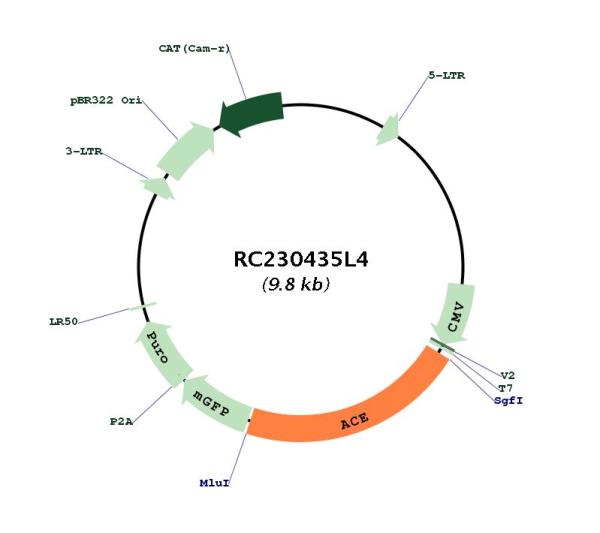Angiotensin Converting Enzyme 1 (ACE) (NM_001178057) Human Tagged Lenti ORF Clone
CAT#: RC230435L4
- LentiORF®
Lenti-ORF clone of ACE (mGFP-tagged)-Human angiotensin I converting enzyme (peptidyl-dipeptidase A) 1 (ACE), transcript variant 3
"NM_001178057" in other vectors (4)
USD 365.00
Specifications
| Product Data | |
| Type | Human Tagged ORF Clone |
| Tag | mGFP |
| Symbol | Angiotensin Converting Enzyme 1 |
| Synonyms | ACE1; CD143; DCP; DCP1 |
| Vector | pLenti-C-mGFP-P2A-Puro |
| E. coli Selection | Chloramphenicol (34 ug/mL) |
| Mammalian Cell Selection | Puromycin |
| Sequence Data |
The ORF insert of this clone is exactly the same as(RC230435).
|
| Restriction Sites |
SgfI-MluI
Cloning Scheme for this gene
Plasmid Map

|
| ACCN | NM_001178057 |
| ORF Size | 2073 bp |
| OTI Disclaimer | The molecular sequence of this clone aligns with the gene accession number as a point of reference only. However, individual transcript sequences of the same gene can differ through naturally occurring variations (e.g. polymorphisms), each with its own valid existence. This clone is substantially in agreement with the reference, but a complete review of all prevailing variants is recommended prior to use. More info |
| OTI Annotation | This clone was engineered to express the complete ORF with an expression tag. Expression varies depending on the nature of the gene. |
| Product Components | The ORF clone is ion-exchange column purified and shipped in a 2D barcoded Matrix tube containing 10ug of transfection-ready, dried plasmid DNA (reconstitute with 100 ul of water). |
| Reconstitution | 1. Centrifuge at 5,000xg for 5min. 2. Carefully open the tube and add 100ul of sterile water to dissolve the DNA. 3. Close the tube and incubate for 10 minutes at room temperature. 4. Briefly vortex the tube and then do a quick spin (less than 5000xg) to concentrate the liquid at the bottom. 5. Store the suspended plasmid at -20°C. The DNA is stable for at least one year from date of shipping when stored at -20°C. |
| Reference Data | |
| RefSeq | NM_001178057.1 |
| RefSeq ORF | 2076 bp |
| Locus ID | 1636 |
| UniProt ID | P12821 |
| Cytogenetics | 17q23.3 |
| Protein Families | Druggable Genome, ES Cell Differentiation/IPS, Protease, Secreted Protein, Transmembrane |
| Protein Pathways | Hypertrophic cardiomyopathy (HCM), Renin-angiotensin system |
| MW | 79.1 kDa |
| Gene Summary | This gene encodes an enzyme involved in blood pressure regulation and electrolyte balance. It catalyzes the conversion of angiotensin I into a physiologically active peptide angiotensin II. Angiotensin II is a potent vasopressor and aldosterone-stimulating peptide that controls blood pressure and fluid-electrolyte balance. This angiotensin converting enzyme (ACE) also inactivates the vasodilator protein, bradykinin. Accordingly, the encoded enzyme increases blood pressure and is a drug target of ACE inhibitors, which are often prescribed to reduce blood pressure. This enzyme additionally plays a role in fertility through its ability to cleave and release GPI-anchored membrane proteins in spermatozoa. Many studies have associated the presence or absence of a 287 bp Alu repeat element in this gene with the levels of circulating enzyme. This polymorphism, as well as mutations in this gene, have been implicated in a wide variety of diseases including cardiovascular pathophysiologies, psoriasis, renal disease, stroke, and Alzheimer's disease. Regulation of the homologous ACE2 gene may be involved in progression of disease caused by several human coronaviruses, including SARS-CoV and SARS-CoV-2. Alternative splicing results in multiple transcript variants encoding both somatic (sACE) and male-specific testicular (tACE) isoforms. [provided by RefSeq, Sep 2020] |
Documents
| Product Manuals |
| FAQs |
| SDS |
Resources
Other Versions
| SKU | Description | Size | Price |
|---|---|---|---|
| RC230435 | ACE (Myc-DDK-tagged)-Human angiotensin I converting enzyme (peptidyl-dipeptidase A) 1 (ACE), transcript variant 3 |
USD 633.00 |
|
| RC230435L3 | Lenti-ORF clone of ACE (Myc-DDK-tagged)-Human angiotensin I converting enzyme (peptidyl-dipeptidase A) 1 (ACE), transcript variant 3 |
USD 933.00 |
|
| RG230435 | ACE (tGFP-tagged) - Human angiotensin I converting enzyme (peptidyl-dipeptidase A) 1 (ACE), transcript variant 3 |
USD 833.00 |
|
| SC329073 | ACE (untagged)-Human angiotensin I converting enzyme (peptidyl-dipeptidase A) 1 (ACE) transcript variant 3 |
USD 697.00 |
{0} Product Review(s)
Be the first one to submit a review






























































































































































































































































 Germany
Germany
 Japan
Japan
 United Kingdom
United Kingdom
 China
China

